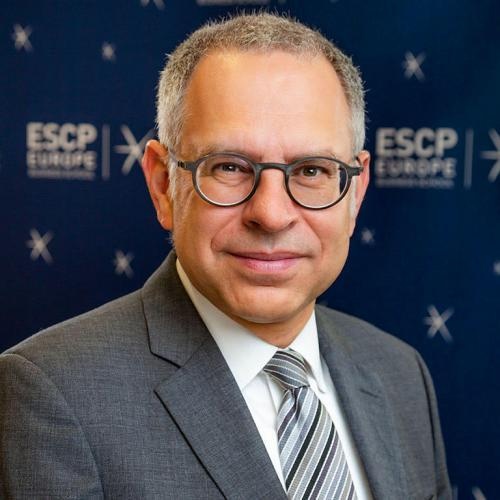Mission of the Research Centre
The research center’s objective is to contribute to research on the future of European Multinationals. European companies are particularly affected by broader developments, such as geopolitical tensions, protectionism, de-globalization or technological disruptions in global value chains. The research center focuses on current challenges for European Multinationals at different levels and investigates solutions to be taken.
- European Multinationals, their governance, their strategies, and their structures (Cluster 1)
- European Multinationals, their managerial and cultural side (Cluster 2)
- European Multinationals in their economic and ecological environment (Cluster 3)
Since ESCP is the only truly European business school, studying European Multinationals in a globalized environment helps to uncover the similarities and differences between Multinationals from different European countries. With our Research Center we bring together IB scholars within ESCP, leveraging existing research on European firms and generating new insights helping European firms in navigating turbulent times.
Our People
Director
Stefan Schmid
Director of The Future of European Multinationals (FEM)
Stefan Schmid is heading the Chair of International Management and Strategic Management at ESCP Business School, Berlin Campus. He held various leadership roles at ESCP, including Director of Studies and Academic Dean for the Master in European Business (now Full Time MBA in International Management) across all campuses, Academic Dean for Executive Education at the Berlin campus, and Academic Dean for the Executive MBA at ESCP. He currently oversees the Executive MBA and the GMP programme at the Berlin campus. He is also heading ESCP's Research Center "The Future of Multinational Enterprises" (FEM). Stefan's teaching has been recognized by various awards, he is a member of numerous academic associations and maintains strong ties with the business world.
Permanent Faculty
Régis Coeurderoy
Professor
Paris
rcoeurderoy@escp.eu
Maral Muratbekova-Touron
Professor
Paris
mmuratbekova@escp.eu
Giulio Nardella
Associate Professor
London
gnardella@escp.eu
Ivan Savin
Associate Professor
Madrid
isavin@escp.eu
Vanessa Strauss-Kahn
Professor
Paris
vstrauss-kahn@escp.eu
Ling Eleanor Zhang
Associate Professor
London
lzhang@escp.eu
Marion Festing
Professor
Berlin
mfesting@escp.eu
Marc Oberhauser
Associate Professor
Madrid
moberhauser@escp.eu
Minna Paunova
Associate Professor
Madrid
mpaunova@escp.eu
Stefan Schmid
Professor
Berlin
sschmid@escp.eu
Olivier Wurtz
Associate Professor
Paris
owurtz@escp.eu
Researchers (PhD students):
- Xuejing Yang, Paris
- Dongjie Xu, Paris
- Yassmina Abdelazim, Paris
- Duong Nguyen Huu Thi Thuy, Paris
- Zhengtian Xia, Berlin
- Jingjun Chen, Berlin
- Kimberley Leich, Berlin
- Isabella van Hooren, Berlin
- Anna-Lena Heinz, Berlin
- Jan-Philipp Leifeld, Berlin
Our Research Activities
We study how Multinationals from Europe staff their top-management and their boards, how they organize their R&D and innovation activities and how they respond to sanctions. This includes the following projects:
- Corporate Innovation and Globalization:
Top R&D-spending multinational enterprises (MNEs) are frequently viewed as Trojan horses of globalization. There is, however, a lack of empirical evidence so far of the greater ability of these MNEs to reach such a global scale. In this research project, we develop a unique panel dataset to provide evidence on the corporate globalization of the largest MNEs in terms of R&D expenditures. We explore the reality of corporate globalization across industries and geographic spaces.Contributors: Regis Coeurderoy, Xuejing Yang, Valerie Duplat (VU Amsterdam)
- Globalization of Ownership and TMTs:
While internationalization of sales, employees and turnover has for a long time been studied in IB, other dimensions have received less attention. In this project we study how ownership and top-management have internationalized (and regionalized or globalized). We focus on building up datasets on European firms, allowing us to study the consequences of ownership and top-management internationalization for firms’ mindsets and strategies.Contributors: Stefan Schmid, Sebastian Baldermann (VU Amsterdam), Felix Rödder (RMIT Vietnam)
- Economic sanctions and market exit strategies of MNCs:
Considering the increasing geopolitical tensions worldwide and the fact that more sanctions than ever before are currently imposed, the impact of sanctions on MNCs market strategies becomes increasingly relevant. While previous research has discussed the legal, political and economic aspects of sanctions, this research project takes an international business perspective and analyzes the impact of sanctions on the market exit decisions of MNCs.Contributors: Marc Oberhauser, Dirk Holtbrügge (Friedrich-Alexander University), Laura Kirste (Friedrich-Alexander University)
We investigate how HR and talent management strategies help European Multinationals to remain competitive. We also focus on strategies of how to solve cultural frictions, within Europe and across the globe.
- Understanding and managing inclusion in the intercultural setting of global work arrangements:
Cultural specificities are under researched in studies of inclusion. With our project, we follow the call for deepening the understanding of inclusion in intercultural workplaces and aim to explore how inclusion is perceived and understood in global work arrangements, particularly in intercultural team settings, and how this can be managed from an international human resource management perspective. To be specific, we attempt to answer the following questions: is workplace inclusion perceived and understood in the same way by members of different cultural backgrounds in intercultural teams? Bringing together the understanding of inclusion following optimal distinctiveness theory, we investigate whether culturally diverse individuals have the same emphasis on the need for uniqueness or belongingness and on the way it is addressed (managed) by organizations.Contributors: Marion Festing and Jingjun Chen
- International and intercultural experience in TMTs and their impact:
International experience is assumed crucial for top managers in MNCs. There are multiple reasons why their international experience may be beneficial. For instance, international experience reflects the proactive behavior of individuals, demonstrating that they wish to embark on new challenges in their careers. International experience often also goes hand in hand with a larger and more diverse network, and top managers with international experience can improve a firm’s diversity and hence help increase its legitimacy. However, we still have a limited understanding in how far international and intercultural experiences at the top are also as beneficial to individuals as always stated, for instance in terms of career success. Hence, we try to study the impact various dimensions of experience have for top managers (and top-managers-to-be).Contributors: Stefan Schmid and Sebastian Baldermann (VU Amsterdam)
- The interplay between personality and host culture in international managers
adjustment abroad
:
Understanding cultural adaptation and the likelihood of expatriation success is a key management issue in the field of international business. Existing literature on this topic can be broadly categorized into two main streams: the macro approach that focuses on inter-national differences and distances, and the micro approach that examines individual-level factors such as cultural intelligence and personality traits. This project proposes to bridge the gap between the micro and macro approaches by exploring the relationship between an individual’s personality traits and the specific cultural dimensions of the host country. By integrating the well-established frameworks of the Big Five personality traits and Hofstede’s cultural dimensions, we aim to provide a more comprehensive understanding of intercultural adaptation and its management implications.Contributors: Olivier Wurtz and Fabrice Lumineau (HKU)
- Navigating Decoupling and Deglobalization
:
The Role of Boundary Spanning Actors in European Multinational Corporations: Managers of European multinationals are key actors engaged in building connections and reconciling differing worldviews across economic, political and social divides. These efforts are widely recognized as boundary spanning activities that contribute to international integration and norm formulation (Edwards et al., 2024; Birkinshaw et al., 2017). The roles of these boundary spanning actors will be pivotal and challenging in light of the currently escalating geopolitical conflicts and intensifying competition in technology. This project aims to examine such boundary spanning activities amid deglobalization and decoupling by developing an understanding of the motivations by MNC boundary spanning actors, as well as the strategic practices, organizational resources and cross-cultural negotiation skills that are required during the process.Contributors: Ling Eleanor Zhang and Maral Muratbekova
We study how climate policy and trade influence European firms and how a variety of stakeholders can contribute to the relations between the EU and other parts of the world, such as China.
- Climate policies and value chains:
The aim of the present research project is to evaluate the impact that climate policies have on transforming Global Value Chains (GVCs) by redirecting production from countries with stringent climate regulation to countries where this regulation is not (yet) introduced. To this end, we investigate how much of the global change in emissions originates in (i) individual efforts of countries to reduce emissions and (ii) the reallocation of market shares between countries. We will then extend the analysis by studying the relationship between stringency of climate policies and emission intensity of entire value chains. This will indicate to us how successful climate regulation has been in the last few decades and how this success varies across countries. Finally, focusing on specific countries, we will use firm-level data to study the reaction individual firms to the changing economic, political and climate regulation.Contributors: Ivan Savin, Vanessa Strauss-Kahn, Philipp Mundt (University of Bamberg)
- Human rights in global value chains:
Despite increasing legislative and societal pressures for corporate accountability of human rights violations within global value chains (GVCs), these issues remain a grand challenge for MNCs. These research projects explore this critical topic. We synthesize insights from international business, supply chain, and business and human rights literature to provide recommendations for MNCs navigating these challenges.Contributors: Marc Oberhauser, Myriam Rapior (University of Hamburg), Hinrich Voss (University of Bristol), Laura Kirste (Friedrich-Alexander University)
- The Multinational ‘Quest for Legitimacy’:
Multinational enterprises (MNEs) are often assumed to be engaged in a ‘quest for legitimacy’ – where substantial and far-reaching efforts are made to establish and protect this ‘hard won’ and ‘easily lost’ resource. However, variance in - and breaches of - corporate social responsibility (CSR) standards across international markets indicate that even those MNEs deemed most ‘socially responsible’ may not always ‘prize’ and ‘protect’ their legitimacy in ways extant literature currently suggests. In order to deepen our understanding, we theorize and explore how firm motivations to ‘gain’ versus ‘protect’ legitimacy reflect two distinct legitimation processes, with significant consequences for the entry mode choices implemented by MNEs. Building on these insights, we then explicate how increased/decreased levels of corporate social performance (CSP) shapes firm legitimation and FDI behavior. Accordingly, our study contributes to advancing theory on the quest for legitimacy in international business.Contributors: Giulio Nardella, Nigel Driffield (Warwick Business School), Irina Surdu (Warwick Business School)
- Reciprocal Integration through Social Exchange:
This project investigates the dynamics of workplace integration between migrants and locals using a novel social exchange framework. It explores how reciprocal integration—voluntary, mutually rewarding exchanges between individuals—can lead to cohesive and productive workplaces. By focusing on the interplay of status, culture, and social positions in shaping these exchanges, the research aims to offer actionable insights into fostering inclusivity and cooperation in diverse organizational settings. The project involves two complementary research streams. The empirical stream uses controlled lab experiments to examine how symbolic power (e.g., country of origin) influences reciprocity in workplace exchanges. The computational stream develops an agent-based model to simulate interactions and explore conditions under which reciprocity fosters social cohesion. Together, these approaches provide a comprehensive understanding of integration at both micro and macro levels.Contributors: Minna Paunova, Ivan Savin, Maribel Blasco (Copenhagen Business School)











